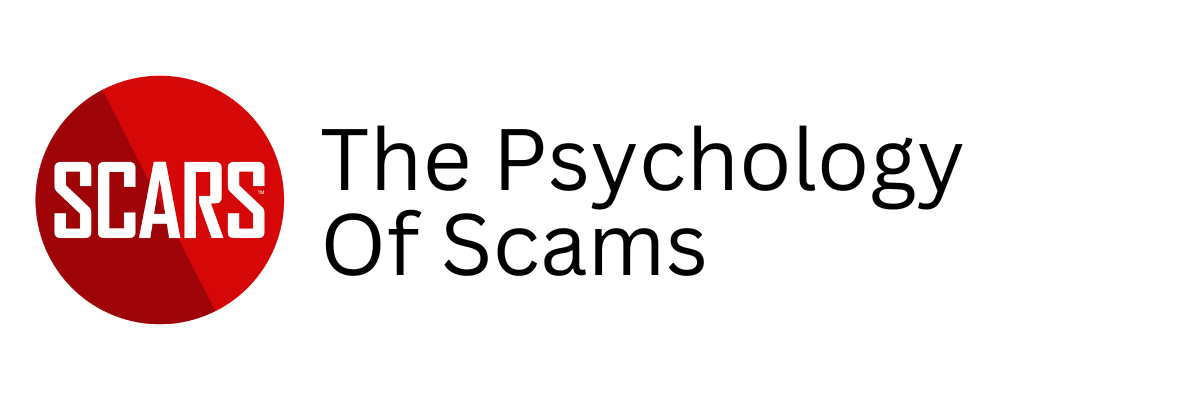Self-Location Uncertainty and Scam Victims
A Common Psychological Phenomenon that Many Experience Can Become Especially Pronounced After a Scam for Scam Victims
Primary Category: Psychology of Scams
Authors:
• Vianey Gonzalez B.Sc(Psych) – Licensed Psychologist, Specialty in Crime Victim Trauma Therapy, Neuropsychologist, Certified Deception Professional, Psychology Advisory Panel & Director of the Society of Citizens Against Relationship Scams Inc.
• Tim McGuinness, Ph.D., DFin, MCPO, MAnth – Anthropologist, Scientist, Polymath, Director of the Society of Citizens Against Relationship Scams Inc.
About This Article
Self-location uncertainty, a cognitive state marked by disorientation in time, space, and identity, can profoundly affect scam victims. This phenomenon, commonly experienced in everyday life through moments of confusion about one’s surroundings or a disjointed sense of time, becomes magnified in scam victims.
The aftermath of a scam can leave individuals feeling temporally and spatially disoriented, unsure of their environment, and distrustful of social relationships. Psychological impacts, such as heightened vigilance, paranoia, and an identity crisis, further exacerbate this uncertainty. Coping strategies, including professional therapy, grounding techniques, and support networks, are crucial for regaining stability and coherence.

The Peculiar Psychological Phenomenon of Self-Location Uncertainty and Scam Victims in the Aftermath of Relationship Scams
What is Self-Location Uncertainty?
Self-location uncertainty is a cognitive and psychological state where an individual feels unsure or disoriented about their position or context in various dimensions, such as time, space, social relationships, or personal identity. This uncertainty can stem from traumatic or disorienting experiences, including scams, which disrupt an individual’s usual sense of coherence and stability.
Most humans encounter self-location uncertainty periodically in their daily lives, often without conscious awareness. This phenomenon can occur in simple, everyday situations such as waking up in an unfamiliar environment, like a hotel room, or experiencing a momentary lapse in recognizing surroundings while daydreaming during a commute. These instances of disorientation are usually brief and resolved quickly as sensory cues and memory align to reestablish a coherent sense of place and identity.
Another common scenario involves technology, particularly when using GPS navigation systems. People may experience fleeting disorientation when the system recalibrates, or when there’s a discrepancy between the map and the physical environment. This can cause temporary uncertainty about one’s exact location – this is that feeling of being lost. Similarly, virtual environments in video games or virtual reality can induce self-location uncertainty as users adjust to digital spaces that may lack the familiar sensory feedback of the physical world. These episodes are typically short-lived and do not significantly disrupt daily functioning, but they highlight the brain’s reliance on consistent sensory input and contextual information to maintain a stable sense of self and location.
Here are the key aspects of self-location uncertainty in detail:
Temporal Disorientation
Present Moment: Individuals may struggle to stay grounded in the present, feeling as though they are constantly reliving past events or anxiously anticipating future threats.
Time Perception: The passage of time may feel distorted. Days can blend together, and individuals may have difficulty recalling when certain events occurred.
Event Sequencing: Victims may find it challenging to organize the sequence of events leading up to and following the scam, leading to confusion about what happened and when.
Spatial Disorientation
Immediate Environment: There can be a pervasive sense of unease or lack of safety in familiar places. Individuals might feel out of place or like they don’t belong in their own home or community.
Navigational Challenges: Even routine tasks like navigating to frequently visited locations can become difficult, as victims may question their memory and perception of these places.
Social Relationship Uncertainty
Trust Issues: Victims often find it hard to trust others, including friends and family, fearing deception or betrayal. This erodes their sense of relational stability.
Isolation: Feeling uncertain about who to trust can lead to social withdrawal and isolation, as individuals prefer to avoid potential threats rather than engage with uncertain social interactions.
Psychological Impact
Identity and Self-Perception: Scams can deeply affect how victims view themselves. They may question their judgment, intelligence, and worth, leading to an identity crisis.
Cognitive Dissonance: Victims may experience mental conflict when their understanding of reality is challenged by the realization of the scam. This can lead to confusion and uncertainty about what is real and what is not.
Existential and Life Path Uncertainty
Life Choices: Victims may second-guess their past decisions and doubt their ability to make sound choices in the future.
Purpose and Direction: The disorientation can extend to broader existential questions, causing individuals to feel lost regarding their purpose and direction in life.
Reality Testing
Questioning Reality: Individuals may frequently question the validity of their perceptions and experiences, doubting whether they can trust their senses and intuition.
Verification Behaviors: This can lead to compulsive behaviors aimed at verifying reality, such as repeatedly checking locks, re-reading emails, or constantly seeking reassurance from others.
Managing Self-Location Uncertainty
Professional Therapy: Cognitive-behavioral therapy (CBT) and other therapeutic approaches can help individuals re-establish a sense of time, place, and self.
Grounding Techniques: Practices such as mindfulness and grounding exercises can help individuals stay connected to the present moment and their immediate surroundings.
Routine and Structure: Establishing a daily routine can provide a sense of predictability and control, helping to counteract feelings of disorientation.
Support Networks: Engaging with trusted friends, family, and support groups can help rebuild trust and provide a sense of social stability.
Educational Resources: Learning about the psychological impacts of scams and how to manage them can empower victims and reduce feelings of confusion and uncertainty.
What Does Self-Locating Uncertainty Feel Like?
Ungrounded moments of self-location uncertainty can feel disorienting and unsettling. It can even induce anxiety or moments of panic!
During these episodes, individuals might experience a sense of being lost or detached from their surroundings, as if they are in a dreamlike state or disconnected from reality. This can be accompanied by confusion about time and place, difficulty recognizing familiar environments, and an overwhelming sense of unease or anxiety.
Psychologically, these moments can be likened to a temporary disruption in one’s internal cognitive map, the mental representation of their spatial environment. This memory-based cognitive map helps navigate and understand surroundings, providing a sense of orientation. When self-location uncertainty occurs, this map becomes unclear or distorted, leading to feelings of disorientation.
Neurologically, these experiences may involve disruptions in the brain regions responsible for spatial awareness and memory. The hippocampus, which plays a crucial role in forming and retrieving spatial memories, may not function optimally during these moments. Additionally, the prefrontal cortex, responsible for higher-order cognitive processes like planning and decision-making, can struggle to integrate sensory information, leading to a breakdown in the coherent perception of one’s environment.
In such ungrounded moments, the brain’s usual ability to process and integrate sensory inputs to create a stable and continuous sense of self and place falters. This disruption can be brief or prolonged, depending on the underlying causes, such as stress, trauma, fatigue, or neurological conditions. Re-establishing grounding through familiar routines, rituals, and artifacts can help restore this sense of orientation and stability.
Another Example of Self-Location Uncertainty
The Sleeping Beauty problem is a philosophical puzzle concerning self-location and probability. It was introduced by philosopher Adam Elga in the early 2000s and involves a thought experiment designed to explore issues in epistemic probability.
Here’s a detailed explanation of the problem:
The Thought Experiment
Setup:
Sleeping Beauty is put to sleep on Sunday.
A fair coin is tossed.
If the coin lands heads, Sleeping Beauty is awakened on Monday and then put back to sleep with her memory of the awakening erased.
If the coin lands tails, she is awakened on Monday, put back to sleep with her memory erased, and then awakened again on Tuesday.
The Awakening:
Each time Sleeping Beauty wakes up, she does not know what day it is or the result of the coin toss.
The question posed to her upon waking is: “What is your credence (degree of belief) that the coin landed heads?”
The Two Main Positions
The “Halfers”:
Halfers argue that the probability of the coin landing heads remains 1/21/2.
Their reasoning is based on the fact that the coin is fair, and the mere fact of waking up does not change the initial 50/50 probability.
The “Thirders”:
Thirders argue that the probability of the coin landing heads is 1/31/3.
Their reasoning involves considering the possible scenarios in which Sleeping Beauty can find herself:
If the coin lands heads, there is 1 awakening (Monday).
If the coin lands tails, there are 2 awakenings (Monday and Tuesday).
Thus, the total number of possible awakenings is 3 (1 for heads and 2 for tails).
Since she has no way to distinguish between these awakenings, the probability of being in the “heads” scenario is 1 out of 3.
Self-Location Aspect
The Sleeping Beauty problem also raises questions about self-location, which refers to an individual’s knowledge or belief about their own position in the world or a sequence of events. In the case of Sleeping Beauty:
Self-location Uncertainty: Upon waking, she doesn’t know whether it is Monday or Tuesday, and she doesn’t know whether the coin toss resulted in heads or tails.
Implications for Probability: This uncertainty about her temporal location (Monday or Tuesday) and the outcome of the coin toss affects her assessment of probabilities.
Philosophical Implications
The Sleeping Beauty problem explores the relationship between self-location uncertainty and probabilistic reasoning. It illustrates how different perspectives on self-location can lead to different conclusions about the same probabilistic question. The debate between halfers and thirders remains an ongoing topic in philosophy, touching upon issues in epistemology, probability theory, and the nature of belief and knowledge.
Self-Location Uncertainty and Scam Victims
Scam victims can experience a form of self-location uncertainty after the scam ends, which can manifest in several ways:
Temporal Disorientation
Immediate Aftermath: Victims may struggle to place themselves temporally in the aftermath of the scam. The shock and emotional distress can lead to confusion about how much time has passed since the scam occurred.
Ongoing Effects: As they process the event, victims might experience a blurred sense of time, making it difficult to distinguish between the recent past and more distant memories.
Perceptual Uncertainty
Trust in Surroundings: Victims may find it hard to trust their immediate environment. They might constantly question whether their surroundings are safe or if they’re being watched or targeted again.
Interpersonal Relationships: There can be uncertainty about who to trust, as the scam might have involved deception from someone they initially trusted. This can lead to a general sense of mistrust towards others.
Psychological Impact
Vigilance and Paranoia: The heightened state of vigilance and paranoia can make victims unsure about their safety and the intentions of others. This self-location uncertainty is rooted in their psychological response to the trauma.
Identity and Self-Perception: Victims might struggle with their sense of identity and self-worth, questioning how they could have been deceived and what this means about their judgment and capabilities.
Existential Questions
Life Path and Decisions: Victims may reconsider past decisions and the path their life has taken up to the point of the scam. They might question their future choices and their ability to make sound decisions.
Reality vs. Deception: Distinguishing between what was real and what was part of the scam can be challenging. Victims may replay events to understand where the deception began, leading to uncertainty about their past experiences.
Coping with Self-Location Uncertainty
Seeking Professional Support: Therapy can help victims process their emotions, re-establish a sense of temporal and spatial orientation, and rebuild trust in themselves and their surroundings.
Reconnecting with Trusted Individuals: Engaging with supportive and trusted friends or family members can provide a sense of security and grounding.
Educational Resources: Learning about common scam tactics and the psychological impacts can help victims understand their experiences and reduce self-blame.
Support Groups: Connecting with other scam victims can provide validation and a shared understanding of the experience, helping to re-establish a sense of normalcy and perspective.
Grounding Yourself in Space & Time
When experiencing self-location uncertainty, grounding oneself in space and time can be achieved through the use of familiar artifacts and consistent routines.
Keeping personal items, such as a watch, a calendar, a recent photo of someone, a piece of jewelry, or a specific keychain, can serve as immediate reminders of one’s location and identity. For instance, wearing a familiar wristwatch not only helps tell time but also provides a tangible link to the present moment and a reminder of daily routines. Similarly, carrying a personal journal or a planner with dates, appointments, and notes can help anchor an individual by offering a quick reference to their schedule and activities, reinforcing their sense of time and place.
Incorporating routines and environmental cues can also significantly reduce self-location uncertainty. For example, setting up a consistent morning routine, such as having coffee in the same spot, using the same mug, or listening to a specific playlist while commuting, can create a stable framework that helps ground a person in their daily life, as long as they are different than the time period that tends to be confused. Visual reminders like photographs of loved ones, a calendar, or a cherished object on a desk can act as touchstones throughout the day. Engaging with these artifacts and routines provides a sense of familiarity and continuity, helping to reorient an individual quickly and effectively whenever they feel disoriented.
Summary
Self-location uncertainty is a complex experience that can significantly affect scam victims. It encompasses disorientation in time, space, social relationships, and personal identity. Understanding and addressing this uncertainty through professional support, grounding techniques, and strong support networks can help individuals regain a sense of stability and coherence in their lives.
Self-location uncertainty is a significant aspect of the psychological aftermath of being scammed. Recognizing this and addressing it through various supportive measures can aid in the recovery process, helping victims regain a sense of control and clarity in their lives.
-/ 30 /-
What do you think about this?
Please share your thoughts in a comment below!
Statement About Victim Blaming
SCARS Institute articles examine different aspects of the scam victim experience, as well as those who may have been secondary victims. This work focuses on understanding victimization through the science of victimology, including common psychological and behavioral responses. The purpose is to help victims and survivors understand why these crimes occurred, reduce shame and self-blame, strengthen recovery programs and victim opportunities, and lower the risk of future victimization.
At times, these discussions may sound uncomfortable, overwhelming, or may be mistaken for blame. They are not. Scam victims are never blamed. Our goal is to explain the mechanisms of deception and the human responses that scammers exploit, and the processes that occur after the scam ends, so victims can better understand what happened to them and why it felt convincing at the time, and what the path looks like going forward.
Articles that address the psychology, neurology, physiology, and other characteristics of scams and the victim experience recognize that all people share cognitive and emotional traits that can be manipulated under the right conditions. These characteristics are not flaws. They are normal human functions that criminals deliberately exploit. Victims typically have little awareness of these mechanisms while a scam is unfolding and a very limited ability to control them. Awareness often comes only after the harm has occurred.
By explaining these processes, these articles help victims make sense of their experiences, understand common post-scam reactions, and identify ways to protect themselves moving forward. This knowledge supports recovery by replacing confusion and self-blame with clarity, context, and self-compassion.
Additional educational material on these topics is available at ScamPsychology.org – ScamsNOW.com and other SCARS Institute websites.
-/ 30 /-
What do you think about this?
Please share your thoughts in a comment below!
SCARS LINKS: AgainstScams.org RomanceScamsNOW.com ContraEstafas.org ScammerPhotos.com Anyscam.com ScamsNOW.com
reporting.AgainstScams.org support.AgainstScams.org membership.AgainstScams.org donate.AgainstScams.org shop.AgainstScams.org
youtube.AgainstScams.org linkedin.AgainstScams.org facebook.AgainstScams.org
Important Information for New Scam Victims
- Please visit www.ScamVictimsSupport.org – a SCARS Website for New Scam Victims & Sextortion Victims.
- SCARS Institute now offers its free, safe, and private Scam Survivor’s Support Community at www.SCARScommunity.org – this is not on a social media platform, it is our own safe & secure platform created by the SCARS Institute especially for scam victims & survivors.
- SCARS Institute now offers a free recovery learning program at www.SCARSeducation.org.
- Please visit www.ScamPsychology.org – to more fully understand the psychological concepts involved in scams and scam victim recovery.
If you are looking for local trauma counselors, please visit counseling.AgainstScams.org
If you need to speak with someone now, you can dial 988 or find phone numbers for crisis hotlines all around the world here: www.opencounseling.com/suicide-hotlines
Statement About Victim Blaming
Some of our articles discuss various aspects of victims. This is both about better understanding victims (the science of victimology) and their behaviors and psychology. This helps us to educate victims/survivors about why these crimes happened and not to blame themselves, better develop recovery programs, and help victims avoid scams in the future. At times, this may sound like blaming the victim, but it does not blame scam victims; we are simply explaining the hows and whys of the experience victims have.
These articles, about the Psychology of Scams or Victim Psychology – meaning that all humans have psychological or cognitive characteristics in common that can either be exploited or work against us – help us all to understand the unique challenges victims face before, during, and after scams, fraud, or cybercrimes. These sometimes talk about some of the vulnerabilities the scammers exploit. Victims rarely have control of them or are even aware of them, until something like a scam happens, and then they can learn how their mind works and how to overcome these mechanisms.
Articles like these help victims and others understand these processes and how to help prevent them from being exploited again or to help them recover more easily by understanding their post-scam behaviors. Learn more about the Psychology of Scams at www.ScamPsychology.org
SCARS INSTITUTE RESOURCES:
If You Have Been Victimized By A Scam Or Cybercrime
♦ If you are a victim of scams, go to www.ScamVictimsSupport.org for real knowledge and help
♦ SCARS Institute now offers its free, safe, and private Scam Survivor’s Support Community at www.SCARScommunity.org/register – this is not on a social media platform, it is our own safe & secure platform created by the SCARS Institute especially for scam victims & survivors.
♦ Enroll in SCARS Scam Survivor’s School now at www.SCARSeducation.org
♦ To report criminals, visit https://reporting.AgainstScams.org – we will NEVER give your data to money recovery companies like some do!
♦ Follow us and find our podcasts, webinars, and helpful videos on YouTube: https://www.youtube.com/@RomancescamsNowcom
♦ Learn about the Psychology of Scams at www.ScamPsychology.org
♦ Dig deeper into the reality of scams, fraud, and cybercrime at www.ScamsNOW.com and www.RomanceScamsNOW.com
♦ Scam Survivor’s Stories: www.ScamSurvivorStories.org
♦ For Scam Victim Advocates visit www.ScamVictimsAdvocates.org
♦ See more scammer photos on www.ScammerPhotos.com
You can also find the SCARS Institute’s knowledge and information on Facebook, Instagram, X, LinkedIn, and TruthSocial
Psychology Disclaimer:
All articles about psychology and the human brain on this website are for information & education only
The information provided in this and other SCARS articles are intended for educational and self-help purposes only and should not be construed as a substitute for professional therapy or counseling.
Note about Mindfulness: Mindfulness practices have the potential to create psychological distress for some individuals. Please consult a mental health professional or experienced meditation instructor for guidance should you encounter difficulties.
While any self-help techniques outlined herein may be beneficial for scam victims seeking to recover from their experience and move towards recovery, it is important to consult with a qualified mental health professional before initiating any course of action. Each individual’s experience and needs are unique, and what works for one person may not be suitable for another.
Additionally, any approach may not be appropriate for individuals with certain pre-existing mental health conditions or trauma histories. It is advisable to seek guidance from a licensed therapist or counselor who can provide personalized support, guidance, and treatment tailored to your specific needs.
If you are experiencing significant distress or emotional difficulties related to a scam or other traumatic event, please consult your doctor or mental health provider for appropriate care and support.
Also read our SCARS Institute Statement about Professional Care for Scam Victims – click here
If you are in crisis, feeling desperate, or in despair, please call 988 or your local crisis hotline – international numbers here.
More ScamsNOW.com Articles
A Question of Trust
At the SCARS Institute, we invite you to do your own research on the topics we speak about and publish. Our team investigates the subject being discussed, especially when it comes to understanding the scam victims-survivors’ experience. You can do Google searches, but in many cases, you will have to wade through scientific papers and studies. However, remember that biases and perspectives matter and influence the outcome. Regardless, we encourage you to explore these topics as thoroughly as you can for your own awareness.















![NavyLogo@4x-81[1] Self-Location Uncertainty And Scam Victims - 2024](https://scamsnow.com/wp-content/uploads/2025/04/NavyLogo@4x-811.png)










![scars-institute[1] Self-Location Uncertainty And Scam Victims - 2024](https://scamsnow.com/wp-content/uploads/2025/04/scars-institute1.png)

![niprc1.png1_-150×1501-1[1] Self-Location Uncertainty And Scam Victims - 2024](https://scamsnow.com/wp-content/uploads/2025/04/niprc1.png1_-150x1501-11.webp)